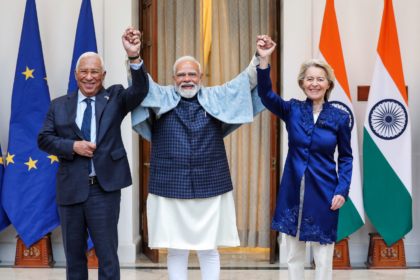Contractual Health Worker from Gujarat Arrested for Allegedly Sharing Classified BSF and IAF Information with Pakistani Agent
In a serious breach of national security, a 28-year-old contractual health worker from Gujarat has been arrested for allegedly sharing sensitive defence-related information with a Pakistani agent. Sahdevhsinh Gohil, a resident of Narayan Sarovar in the Lakhpat taluka of Gujarat’s Kutch district, was taken into custody on Saturday by the Gujarat Anti-Terrorism Squad (ATS) after being found guilty of passing on classified details pertaining to the Border Security Force (BSF) and the Indian Air Force (IAF).
According to the Gujarat ATS, the arrest followed an intelligence tip received by sub-inspector R.R. Garchar on April 29. This intelligence surfaced just days after a deadly terrorist attack in Pahalgam, Jammu and Kashmir, that claimed the lives of 25 tourists and one local pony guide. This timing heightened the urgency of the investigation, prompting swift action by the authorities.
Gohil, who worked as a contractual employee at the Primary Health Centre (PHC) in the Mata No Madh area of Kutch, was accused of communicating with a Pakistani woman agent via WhatsApp. The agent, using the alias Aditi Bharadwaj, reportedly initiated contact with Gohil in July 2023. Over the following months, Gohil allegedly sent numerous photos and videos depicting strategic BSF posts, Indian Navy installations, and construction activities along the highly sensitive India-Pakistan coastal border in Gujarat.
Speaking to the media in Ahmedabad, Gujarat ATS Superintendent of Police K. Siddharth confirmed the arrest and the charges. “We had received credible inputs that Sahdevhsinh Gohil had been involved in transmitting classified information about BSF and IAF movements and infrastructure to a foreign agent based in Pakistan. Our investigation has validated these concerns,” Siddharth said.
The ATS investigation uncovered that in January, Gohil obtained a SIM card under a false identity. He handed over the One-Time Password (OTP) linked to the WhatsApp account on that number to the Pakistani agent. This allowed the foreign agent to operate a WhatsApp account linked to a mobile number based in India, thereby helping her maintain covert communication.
Further forensic analysis of Gohil’s mobile phone, which had been sent to the Forensic Science Laboratory (FSL), provided damning evidence. The phone contained WhatsApp chats, multimedia files, call records, and photos of restricted military zones. Officials confirmed that these images included detailed visuals of BSF and Indian Navy installations as well as activities near construction sites close to the border.
The forensic team also confirmed that the WhatsApp numbers used by the agent, who identified herself as Aditi Bharadwaj, were being operated from Pakistan. Based on this data and Gohil’s confession, a formal case has been registered under sections 61 and 148 of the Bharatiya Nyaya Sanhita (BNS).
The arrest highlights an alarming trend of “contractual espionage,” wherein individuals with legitimate access to sensitive areas are lured or coerced into leaking confidential information. According to the ATS, Gohil was paid up to ₹40,000 for each batch of classified data he sent. These payments were allegedly routed through untraceable digital channels or third-party intermediaries, making the transactions harder to detect.
In a statement issued by the Gujarat ATS, the authorities detailed the evidence collected. “We have secured not only the confession of the accused but also digital evidence including photographs, messages, and transaction details. These all point to a deliberate act of espionage,” the statement read.
Upon receiving the intelligence report and confirming its authenticity through central agencies, a special ATS team was formed. The task force included Inspector P.B. Desai, Sub-Inspector (Wireless) D.V. Rathod, and Police Sub-Inspector R.R. Garchar. The operation was conducted under the supervision of Deputy Superintendents of Police Siddharth Chorolonda and Niraj Upadhyay. Gohil was taken into custody on May 1 and is currently being interrogated at the ATS headquarters in Ahmedabad.
The arrest has sent shockwaves through the defence and intelligence community, raising concerns about the vulnerabilities in non-military staff stationed near sensitive zones. It also underscores the evolving nature of espionage in the digital age, where even basic communication tools like WhatsApp can become conduits for leaking vital national security information.
Gujarat ATS has vowed to continue its investigation and coordinate with national and international agencies to track down the full extent of the espionage ring. Efforts are underway to identify any possible accomplices or further leaks connected to the network.
This incident is a sobering reminder of the challenges faced by national security forces in safeguarding sensitive information in a hyper-connected world. With cyber-espionage becoming increasingly sophisticated, vigilance, technology, and robust internal monitoring systems are more critical than ever.







